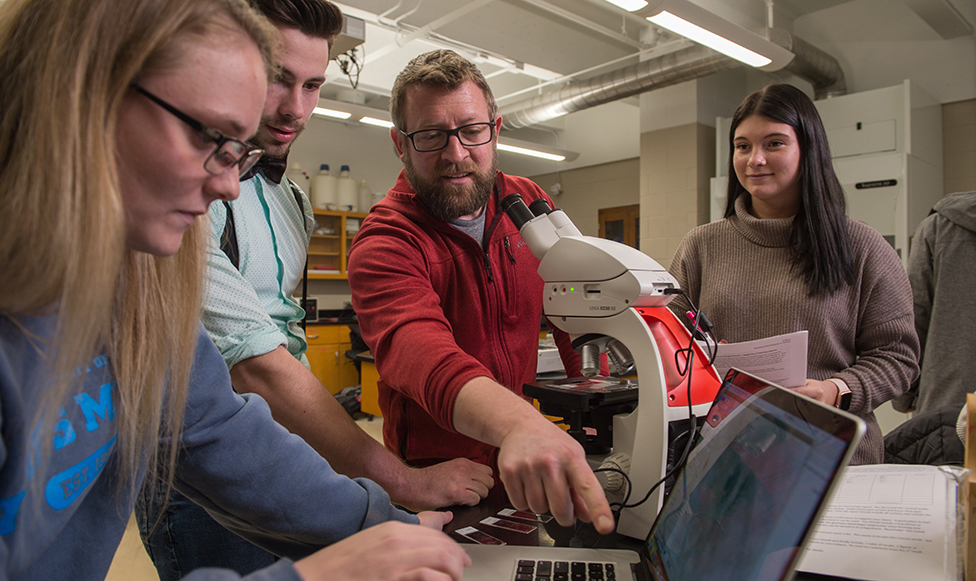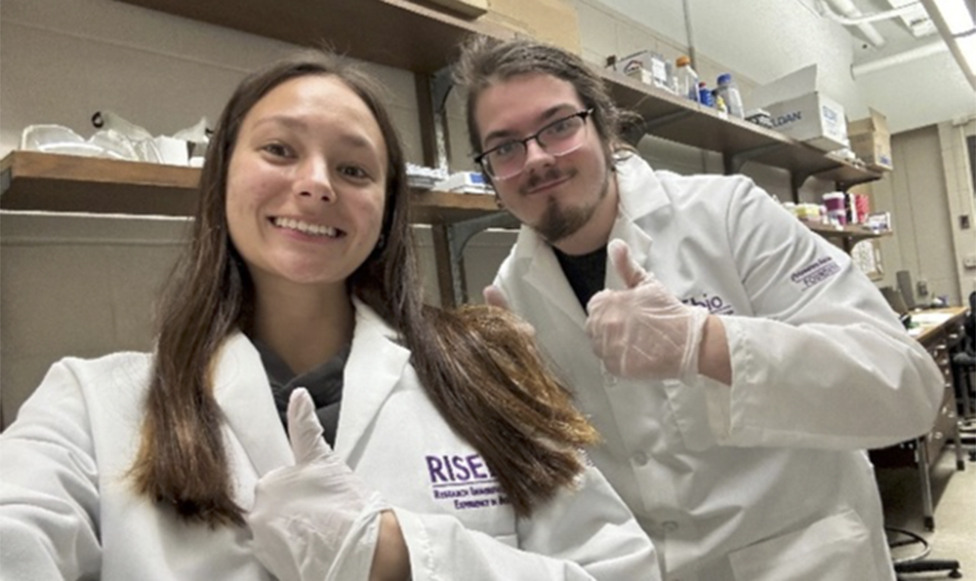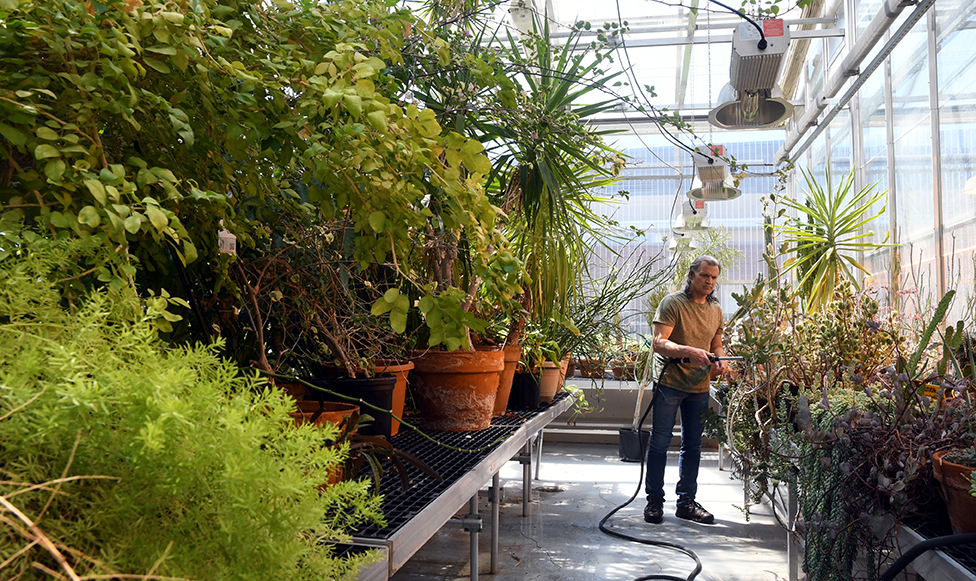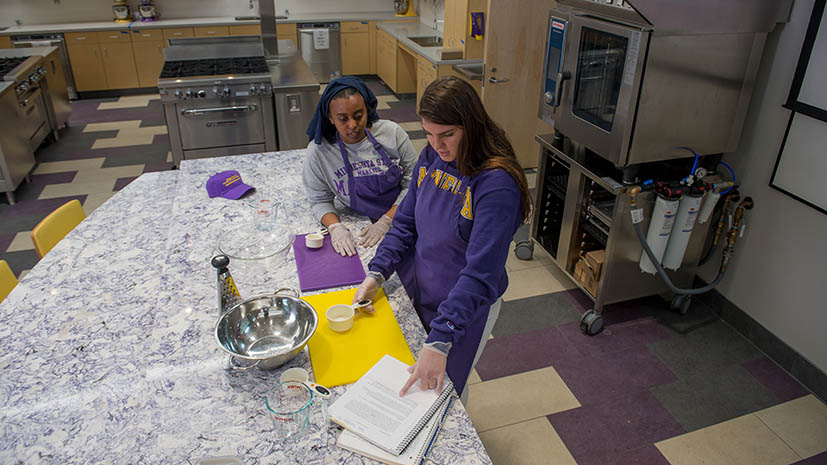
Biology
Careers in Biology
Obtaining a degree in one of our biology programs prepares students for a variety of career opportunities.
- Biologist
- Medical Laboratory Scientist
- Pre-Med
- Genetic Researcher
- Animal Scientist
- Biomedical Engineer
- Epidemiologist
- Medical Laboratory Scientist
- Clinical Researcher
- Nuclear Medicine Technologist
Potential Salary
Median Salary $71,000
Biology Degrees at MSU
Biology, Bachelor of Science–Biomedical and Cellular Biology
The Biomedical and Cellular Biology program prepares students to become future leaders. Pursuing careers in healthcare, translational or significant scientific research, graduates hold the key to the future. Students are prepared to collaborate, interpret and visualize data, which is crucial to succeed in this rapidly growing field.
Biology, Bachelor of Science–Organismal Biology and Ecology
The Organismal and Ecology program is designed for students fascinated with the diversity of living things and the biology of populations, communities, and ecosystems. This degree is an excellent option for students with an interest in Zoology, Plant Science, Ecology, Animal Behavior, or Evolutionary Biology.
Biology, Minor
The Biology Minor is designed to complement science focused majors and provides a base level understanding of the field to contribute to finding solutions to complex multidisciplinary problems.
Biology, Master of Science
A flexible graduate program that allows students to tailor their studies to professional goals, with diverse faculty guiding impactful research.
Biotechnology, Bachelor of Science
Students in this program gain expertise in genetic engineering, biochemical processes, and quantitative science, preparing for careers in biotech innovation.
Clinical and Diagnostic Sciences, Bachelor of Science–Cytotechnology Emphasis
The Clinical and Diagnostic Sciences Cytotechnology emphasis focuses on studying cells microscopically to detect disease and cancer. Cytotechnologists identify precancerous, malignant, and infectious conditions using specialized techniques. The 4 year program includes 3 years of on-campus coursework and one-year clinical internship. Graduates can take their certifying exam after completing the internship.
Clinical and Diagnostic Sciences, Bachelor of Science–Medical Laboratory Sciences
The Clinical and Diagnostic Sciences Medical Laboratory Science program focuses on the analysis of blood, body fluids, tissues, and cells to aid in the diagnosis, treatment, and prevention of disease. A Medical Laboratory Scientist (MLS) is a vital member of the healthcare team with employment opportunities in hospital, clinic, research, and pharmaceutical laboratories. The program includes a one year off campus clinical internship.
Clinical and Diagnostic Science, Bachelor of Science–Nuclear Medicine Technology
Nuclear Medicine Technology is a highly specialized allied healthcare field that utilizes radioactive materials in diagnosis, treatment of disease, and medical research. The four year Nuclear Medicine Technology Program curriculum consists of three years spent at the university completing required courses and electives. The program includes a one year off-campus clinical internship.
Biology, Bachelor of Science–Biomedical and Cellular Biology
The Biomedical and Cellular Biology program prepares students to become future leaders. Pursuing careers in healthcare, translational or significant scientific research, graduates hold the key to the future. Students are prepared to collaborate, interpret and visualize data, which is crucial to succeed in this rapidly growing field.
Biology, Bachelor of Science–Organismal Biology and Ecology
The Organismal and Ecology program is designed for students fascinated with the diversity of living things and the biology of populations, communities, and ecosystems. This degree is an excellent option for students with an interest in Zoology, Plant Science, Ecology, Animal Behavior, or Evolutionary Biology.
Biology, Minor
The Biology Minor is designed to complement science focused majors and provides a base level understanding of the field to contribute to finding solutions to complex multidisciplinary problems.
Biology, Master of Science
A flexible graduate program that allows students to tailor their studies to professional goals, with diverse faculty guiding impactful research.
Biotechnology, Bachelor of Science
Students in this program gain expertise in genetic engineering, biochemical processes, and quantitative science, preparing for careers in biotech innovation.
Clinical and Diagnostic Sciences, Bachelor of Science–Cytotechnology Emphasis
The Clinical and Diagnostic Sciences Cytotechnology emphasis focuses on studying cells microscopically to detect disease and cancer. Cytotechnologists identify precancerous, malignant, and infectious conditions using specialized techniques. The 4 year program includes 3 years of on-campus coursework and one-year clinical internship. Graduates can take their certifying exam after completing the internship.
Clinical and Diagnostic Sciences, Bachelor of Science–Medical Laboratory Sciences
The Clinical and Diagnostic Sciences Medical Laboratory Science program focuses on the analysis of blood, body fluids, tissues, and cells to aid in the diagnosis, treatment, and prevention of disease. A Medical Laboratory Scientist (MLS) is a vital member of the healthcare team with employment opportunities in hospital, clinic, research, and pharmaceutical laboratories. The program includes a one year off campus clinical internship.
Clinical and Diagnostic Science, Bachelor of Science–Nuclear Medicine Technology
Nuclear Medicine Technology is a highly specialized allied healthcare field that utilizes radioactive materials in diagnosis, treatment of disease, and medical research. The four year Nuclear Medicine Technology Program curriculum consists of three years spent at the university completing required courses and electives. The program includes a one year off-campus clinical internship.

Undergraduate Research
Students in our biology program find many opportunities to showcase their research at various conferences and symposiums. Through dedicated faculty guidance and established industry partnerships, these opportunities help our students gain experiences that help to shape areas that they are most passionate about.

Research Immersive Scholastic Experience in Biology (RISEbio)
RISEbio gives entering first-year students interested in pursuing a degree in biology or biochemistry the opportunity to engage in real-world research with faculty, peer mentors, and graduate students. RISEbio participants are also part of a learning community during their first year. The learning community provides early and preregistration to specific courses as well as structured study groups, and mentor support.

Facilities
Our modern facilities are supported by a media kitchen, environmental chambers, vivarium, greenhouse complex, herbarium, and animal museum collection. Our facilities and equipment are suitable for investigations ranging from ecosystem analysis to subcellular physiology.
Learn More
Pre-Med Club
The Pre-Med Club is open to any pre-professional major. The Pre-Med Club is based around volunteerism and team work. Speakers come in on a regular basis ranging from medical students, doctors, and admissions officers from medical schools. Volunteer opportunities offered throughout the year include Rake the Town, the Annual Pre-Med Blood Drive, Relay for Life and many fundraisers. We also do presentations on important topics such as how to apply to medical school, taking the MCAT, and opportunities to get involved with research.
Ducks Unlimited
The Minnesota State Mankato Chapter of Ducks unlimited is part of the larger national organization which focuses on habitat conservation in wetlands and the protection of waterfowl.
Zoology Club
The Minnesota State Mankato Zoology Club is aimed at sharing knowledge, participating in volunteer opportunities, education others, and making connections within various animal fields.
Environmental Sustainability Organization
The Environmental Sustainability Organization (ESO) strives to improve the environmental well-being of Minnesota State University, Mankato’s campus and the greater Mankato Area community. It does so by organizing on and off-campus volunteer opportunities, promoting sustainable living, and centering meetings and events around eco-friendly practices.
Related Programs

Environmental Science
Environmental Sciences is an applied science designed to study interactions among biological, chemical and physical components of the environment.

Food Science Technology, Bachelor of Science
The Bachelor of Science in Food Science Technology is designed to prepares students for entry into production, quality assurance and management; sanitation; research and development; and laboratory analysis opportunities.

Life Science Teaching, Bachelor of Science
The Bachelor of Science in Life Science Teaching allows students to utilize their passion for the natural world in the classroom. This program satisfies licensure-to-practice standards for Minnesota and may satisfy standards for other states or US territories.
Biology Department
College of
Science, Engineering and Technology
Become part of the next generation of leaders, innovators, and researchers as a student at Minnesota State Mankato’s College of Science, Engineering and Technology. Whether you're fascinated by the natural world, modern engineering, or advancements in technology, you belong here.
Learn More About the College of Science, Engineering and Technology
